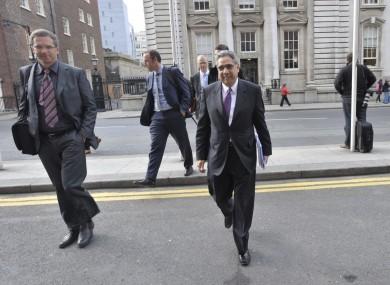'Troika' told bailout agreement must be updated

At a meeting with officials from the ECB/IMF/European Commission 'troika' yesterday (11 July) Social Justice Ireland argued that Ireland's bailout agreement "is dispossessing poor and vulnerable people of their meagre resources so as to re-pay those banks, financial institutions and others who gambled recklessly but lost their gamble."
At the one and a half hour meeting the delegation said that “an updated Memorandum of Understanding is required which would achieve economic growth and financial stability while securing real protection for poor and vulnerable people."
Asked on Morning Ireland what they hoped to achieve with the meeting, Dr Seán Healy, director of Social Justice Ireland said: "It was important they be briefed on the consequences of the Memorandum of Understanding and the bailout agreement.
There is a recognition that the agreement is being updated all the time and I think it's very important that it be redone in light of the evidence that is emerging; in light of its impact on one side, but also the failures in terms of the results that are supposed to be emerging from it.
What we were showing them is that the evidence suggests, very clearly, that there is a transfer of resources going on - from poor and vulnerable people to groups like financial institutions.
How are they going to know this unless somebody tells them?"
The delegation told the troika that at a macro level the bailout agreement "requires too big a set of changes and it seeks to achieve these at too fast a pace". They argued that these factors are combining to undermine economic growth and any potential for recovery, and said that the adjustments being imposed would require the economy to record Celtic Tiger growth rates to have any prospect of recovery or job creation. Such growth rates, they suggested, are not credible given the current Irish and global economic situation.
The group also pointed out that despite conditions being honoured and benchmarks on a wide range of issues met by the Irish Government and Ireland’s citizens, "the promised outcomes are not materialising" - namely, economic growth is not reaching the forecast targets; jobs are not being created on the scale required; and unemployment is not falling at the rate envisaged.
They presented detailed proposals on issues such as poverty and income distribution, employment and job creation, securing finance for small and medium enterprises, unemployment and labour market activation, adult literacy and a wide range of public services (see below).
Says Dr Healy: “In precarious times such as these a country, a government, a society or an international institution defines itself by the cuts it makes, the people it protects, its effectiveness on economic growth/jobs, Its actions on public services and the values underpinning its choices. Using this yardstick, the ECB, the IMF and the European Commission have acted in the interests of the wealthy and the strong while seriously damaging those who are poor and vulnerable.”
